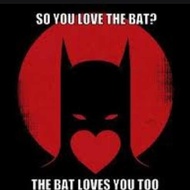Enjoy being online again!
Welcome to the community of good people who base their values on evidence and appreciate civil discourse - the social network you will enjoy.Create your free account
1 comment
Feel free to reply to any comment by clicking the "Reply" button.Yes, I took online training to be a Contact Tracker, it discussed the origins of the disease. BATS. Ewwww. There is a great deal we don't know about the disease, and we need to learn quickly.
Oh, look at you being all grossed-out by bats! 
Have you done any work yet as a contact tracer?
@AmyTheBruce No, I took the course to show that I was doing something to improve my future. I have looked into a few jobs, but right now they're not hiring. Today I am filing for unemployment with my state, and I wanna shoot myself. They have the most clunky website ever. As I have really just started, and with the numbers going up... I may get a call after all.
Bats play an important role in our ecosystems.
The majority of bats eat night-flying insects, including many agricultural pests. As the primary predators of night-flying insects bats play a significant role in controlling insect populations. Estimates from studies show that some bats eat more than 70% of their weight in insects each night and some pregnant females at 100% of their body weight (that’s a lot of insects!). Another way of looking at it, taken from an example on the Bat Conservation International website, is that: “A single little brown bat can eat up to 1,000 mosquito-sized insects in a single hour.” Leading to speculation about their role in controlling mosquitoes – which may reduce the spread of malaria. De Hoop cave is the largest known roost in South Africa with an estimated 300,000 bats congregating there each year. Due to the large numbers of bats eating insects in the area (an estimated 100 tons every year) the farmers are believed to be saving thousands of rands on insecticides each year.
@balou I love, love, love bats, I just don't wanna look at them. I love that they eat insects, and it is fascinating how they navigate. I just don't' want them up close and personal.
@HippieChick58 Batman will be so thrilled!
Enjoy being online again!
Welcome to the community of good people who base their values on evidence and appreciate civil discourse - the social network you will enjoy.Create your free account
Share this post
Categories
Agnostic does not evaluate or guarantee the accuracy of any content. Read full disclaimer.









